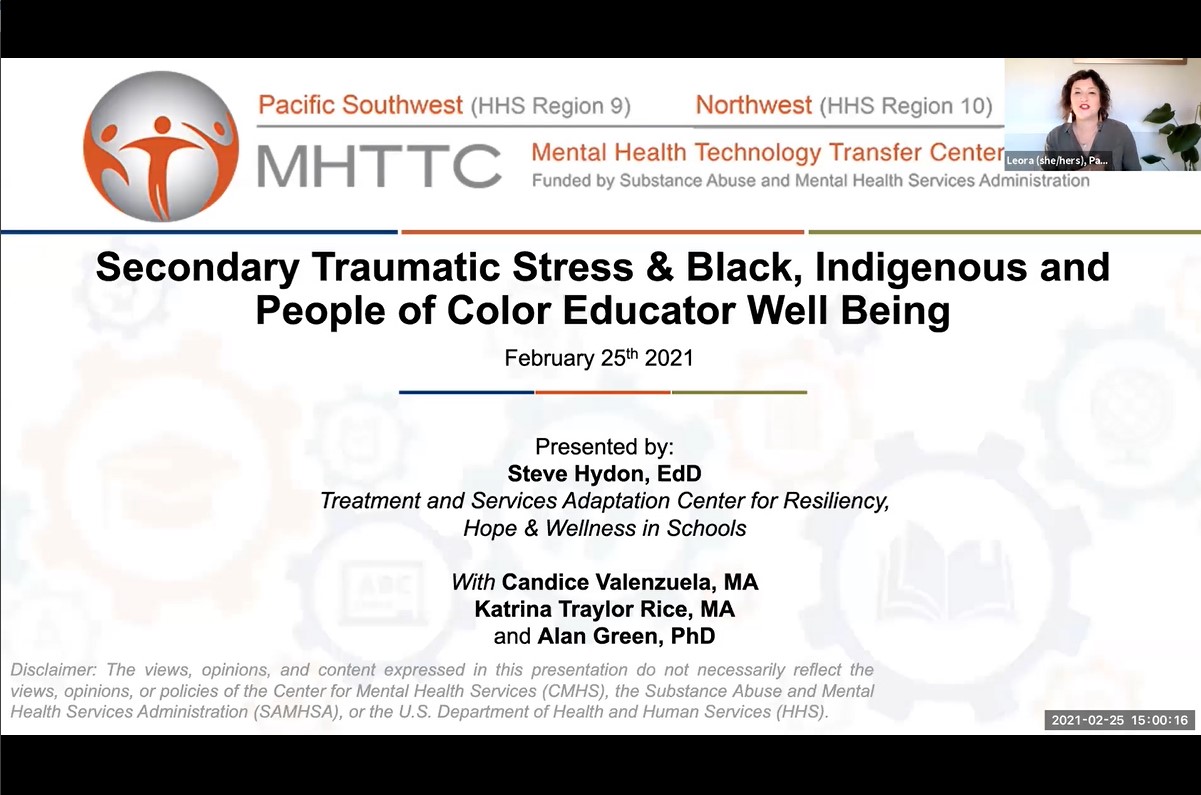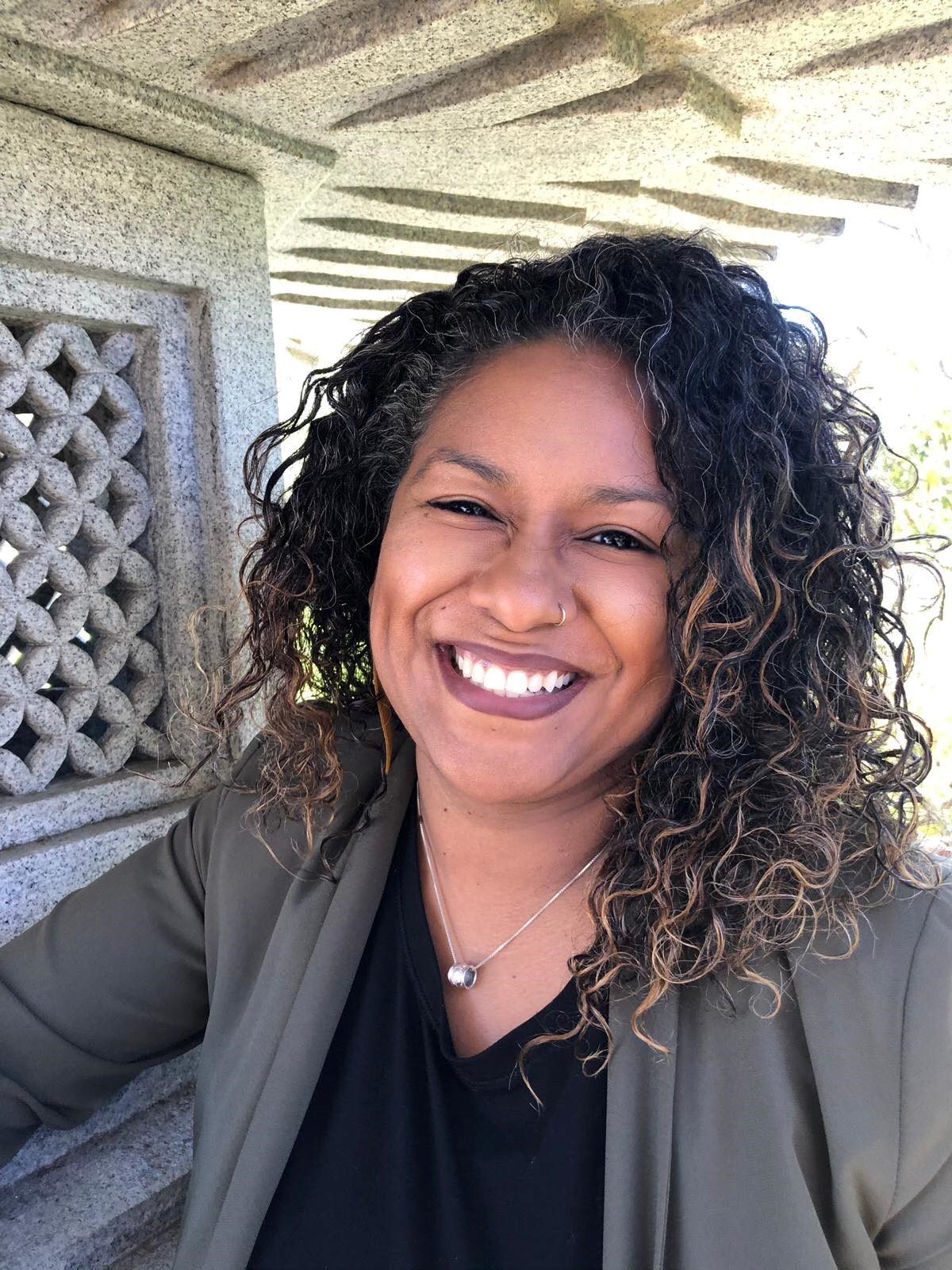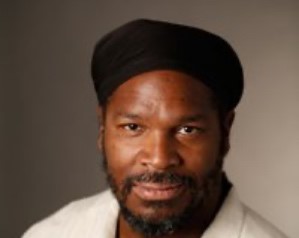
Committing to equity means committing to disrupting harm interpersonally as well as institutionally. This session centers the experience and wellness needs of BIPOC Educators and highlights the connection between radical self-care, cultural humility, collective and systemic care and secondary traumatic stress intervention in our school systems.
Learning Objectives
Resources
The Northwest MHTTC and the Pacific Southwest MHTTC are continuing our partnership to provide and extend deeper technical assistance on the Interconnected Systems Framework (ISF).
Interconnected Systems Framework (ISF) is a structure and process that maximizes effectiveness and efficiency by blending the strengths of school and community mental health with strengths of the multi-tiered framework of PBIS (Barrett, Eber, Weist, 2013)
This past year, we offered three webinars on the Interconnected Systems Framework (see below for recordings) and followed the learning series up with monthly discussion hours led by Susan Barrett and field leaders from our region.
This year, we are offering more programming to deepen your ISF work and contextualize ISF to this moment of COVID-19 and beyond. Our fall offering is made up of four modules and ends with a town hall for you to be able to ask faculty your questions and resource one another. Each module includes teaching from Susan Barrett and field leaders on ISF systems, and USC faculty on ISF practices.
 Steve Hydon, MSW, EdD, is a clinical professor in field education and serves as chair of the Pupil Personnel Services Credential program. His interests are in child welfare, secondary traumatic stress and social work practice in schools. Hydon developed a secondary traumatic stress survey for teachers and mental health practitioners in schools and is a consultant to the U.S. Department of Education as an educator resilience facilitator. He has trained nationwide on secondary traumatic stress, compassion fatigue, educator resilience and the Psychological First Aid - Listen, Protect, Connect, Model, and Teach curriculum for school personnel. He is a member of the National Child Traumatic Stress Network and the Trauma and Services Adaptation Center for Resiliency, Hope and Wellness in Schools. He also serves as the liaison to the NCTSN’s Terrorism and Disaster Center and sits on the board of the American Council on School Social Work. Previously, he served as a board member of the School Social Work.
Steve Hydon, MSW, EdD, is a clinical professor in field education and serves as chair of the Pupil Personnel Services Credential program. His interests are in child welfare, secondary traumatic stress and social work practice in schools. Hydon developed a secondary traumatic stress survey for teachers and mental health practitioners in schools and is a consultant to the U.S. Department of Education as an educator resilience facilitator. He has trained nationwide on secondary traumatic stress, compassion fatigue, educator resilience and the Psychological First Aid - Listen, Protect, Connect, Model, and Teach curriculum for school personnel. He is a member of the National Child Traumatic Stress Network and the Trauma and Services Adaptation Center for Resiliency, Hope and Wellness in Schools. He also serves as the liaison to the NCTSN’s Terrorism and Disaster Center and sits on the board of the American Council on School Social Work. Previously, he served as a board member of the School Social Work.
 Candice Valenzuela is a proud Afro-Latinx native of Watts, CA. She has worked at the crossroads of education and healing for 16 years. Candice earned a Bachelor of Arts in Humanities and a minor in Philosophy at Loyola Marymount University, received a teaching credential from Alliant University, and a Master of Arts in East-West Psychology at the California Institute for Integral Studies. Candice is certified as a trauma-informed yoga and mindfulness instructor through the Niroga Institute. Candice is currently training as a Marriage and Family Therapist in California. Candice believes that ancestral, community and ecological healing are the most urgent issues of our time. She coaches administrators, trains teachers and leads professional development at schools throughout the nation in addition to teaching in the Teacher Education department at University of San Francisco.
Candice Valenzuela is a proud Afro-Latinx native of Watts, CA. She has worked at the crossroads of education and healing for 16 years. Candice earned a Bachelor of Arts in Humanities and a minor in Philosophy at Loyola Marymount University, received a teaching credential from Alliant University, and a Master of Arts in East-West Psychology at the California Institute for Integral Studies. Candice is certified as a trauma-informed yoga and mindfulness instructor through the Niroga Institute. Candice is currently training as a Marriage and Family Therapist in California. Candice believes that ancestral, community and ecological healing are the most urgent issues of our time. She coaches administrators, trains teachers and leads professional development at schools throughout the nation in addition to teaching in the Teacher Education department at University of San Francisco.
 Katrina Traylor Rice is the Whole Child Initiative Manager for Alder Graduate School of Education, working to ensure that all Alder residents become whole child educators. Katrina is a National Board-Certified Teacher with over 15 years of teaching experience in urban secondary classrooms. She began her career at June Jordan School for Equity, in San Francisco, where she also worked as an administrator. Katrina then worked at her former high school, Jesse M. Bethel High School, in Vallejo, where she spent six years as the lead teacher of the Law Academy. Katrina has taught English and history at all grade levels and loves teaching students to be engaged readers of history, literature, and the world around them. Katrina is deeply passionate about creating healing-centered classrooms through trauma informed care practices including restorative justice, mindfulness, and culturally sustainable curriculum. She holds a M.A. in Education from Stanford’s Teacher Education Program, and a B.A. from UC Santa Cruz in American Studies.
Katrina Traylor Rice is the Whole Child Initiative Manager for Alder Graduate School of Education, working to ensure that all Alder residents become whole child educators. Katrina is a National Board-Certified Teacher with over 15 years of teaching experience in urban secondary classrooms. She began her career at June Jordan School for Equity, in San Francisco, where she also worked as an administrator. Katrina then worked at her former high school, Jesse M. Bethel High School, in Vallejo, where she spent six years as the lead teacher of the Law Academy. Katrina has taught English and history at all grade levels and loves teaching students to be engaged readers of history, literature, and the world around them. Katrina is deeply passionate about creating healing-centered classrooms through trauma informed care practices including restorative justice, mindfulness, and culturally sustainable curriculum. She holds a M.A. in Education from Stanford’s Teacher Education Program, and a B.A. from UC Santa Cruz in American Studies.
 Dr. Alan Green joined Rossier in July 2009 as Associate Professor of Clinical Education. Prior to USC he was on the faculty at Johns Hopkins University School of Education, where he served most recently as chair of the Department of Counseling and Human Services. He earned a doctorate in counseling psychology from Howard University in Washington, DC and a master's degree in school and community counseling from California State University in Sacramento. Dr. Green has served as project evaluator and consultant to educational and community-based organizations across the United States and the Caribbean. Dr. Green was a recipient of the 2006 Counselors for Social Justice 'Ohana Honors Award for his efforts to affirm diversity and advocate for social justice. More recently he was a 2014 recipient of the USC Mellon Mentoring award for his work with graduate students.
Dr. Alan Green joined Rossier in July 2009 as Associate Professor of Clinical Education. Prior to USC he was on the faculty at Johns Hopkins University School of Education, where he served most recently as chair of the Department of Counseling and Human Services. He earned a doctorate in counseling psychology from Howard University in Washington, DC and a master's degree in school and community counseling from California State University in Sacramento. Dr. Green has served as project evaluator and consultant to educational and community-based organizations across the United States and the Caribbean. Dr. Green was a recipient of the 2006 Counselors for Social Justice 'Ohana Honors Award for his efforts to affirm diversity and advocate for social justice. More recently he was a 2014 recipient of the USC Mellon Mentoring award for his work with graduate students.
Want more information and school mental health resources? Visit the Northwest MHTTC's School Mental Health page and sign up for our monthly newsletter for regular updates about events, trainings, and resources available to the Northwest region.